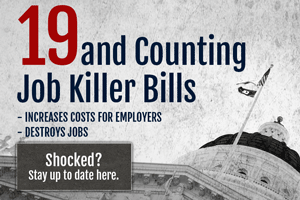 The Senate yesterday passed two California Chamber of Commerce-opposed job killer bills that, if signed into law, may increase costs for California businesses and create regulatory burdens throughout the state.
The Senate yesterday passed two California Chamber of Commerce-opposed job killer bills that, if signed into law, may increase costs for California businesses and create regulatory burdens throughout the state.
- SB 32 (Pavley; D-Agoura Hills) Halts Economic Growth — Increases costs for California businesses, makes them less competitive and discourages economic growth by adopting further greenhouse gas emission reductions for 2030 and 2050 without regard to the impact on individuals, jobs and the economy.
- SB 350 (de León; D-Los Angeles) Costly and Burdensome Regulations — Potentially increases costs and burdens on all Californians by mandating an arbitrary and unrealistic reduction of petroleum use by 50%, increasing the current Renewable Portfolio Standard to 50% and increasing energy efficiency in buildings by 50% — all by 2030 without regard to the impact on individuals, jobs and the economy.
SB 32: Slows Economic Growth
SB 32 mandates a reduction in greenhouse gas emissions to 80% below 1990 levels by 2050 with no consideration of the economic side effects.
AB 32 was passed and signed into law in 2006 to reduce greenhouse gas emissions to 1990 levels by 2020, equivalent to a 30% reduction in emissions compared to a “business as usual” trend. Through a combination of command-and-control and market measures, along with a deep persistent economic recession, California is capable of meeting that goal. What is not known is whether these goals have been met in a cost-effective manner, and what the economic and environmental side effects have been.
While CalChamber appreciates the need to address climate change, we should have the opportunity to know what has worked with the implementation of AB 32 before creating additional climate change mandates. Post -2020 climate policies need to be made with the aid of rigorous, objective and impartial analysis of the costs, impacts, benefits and alternatives for moving forward. The Legislature deserves a robust, informed analysis and to be informed before giving the California Air Resources Board (CARB) carte blanche authority to move forward.
Before any additional greenhouse gas emission reduction targets are set, there must be a credible and independent marginal cost analysis on the strategies adopted thus far in order to educate and guide greenhouse gas emission reductions post 2020. This will allow the Legislature to make informed decisions, provide appropriate guidance to regulatory agencies, and effectively oversee agency implementation to ensure that the costs and benefits of policy choices are realized.
Before extending the greenhouse gas reduction mandate beyond 2020, the Legislature should independently evaluate the cost and benefit of the state’s current climate change programs to better understand what has and has not worked.
SB 350: Increased Fuel/Energy Costs
SB 350 provides broad and undefined authority to CARB to adopt regulations, standards and specifications “in furtherance of achieving a reduction of petroleum use in motor vehicles by 50% by January 1, 2030….” This bill does not specify whether CARB should adopt and implement policies that have an impact on the demand for petroleum fuels, or whether it should adopt and implement policies that affect the supply of transportation fuels. SB 350 provides a blank check delegation of authority to CARB, and in doing so, gives no consideration to the cost or job loss associated with this to-be-determined regulation.
Most of California’s businesses and families rely on petroleum for their day-to-day transportation needs and SB 350 may compromise the availability of transportation fuels. The California Energy Commission reported in its 2014 Integrated Energy Policy Report that 92% of all transportation fuels in California are made up of petroleum. Businesses rely on petroleum to transport goods and people, and it is unclear how this arbitrary goal will be met. Will there be a 50% straight reduction in the production of petroleum in the state? Will we have to ration petroleum to achieve the 50% reduction? At what cost?
In addition to the 50% reduction in petroleum, SB 350 also seeks to increase the current Renewable Portfolio standard from 33% to 50% as well as increase energy efficiency in buildings to 50%. Both policies will significantly increase costs to ratepayers. California’s energy price per kilowatt hour is among the highest in the nation and our energy efficiency standards are among the strongest. Upgrading current energy efficiency standards while increasing the cost of energy makes California’s businesses less competitive.
The bills now go to the Assembly and will be assigned to policy committees for hearings soon.
Staff Contact: Amy Mmagu


